Top 20 Best and Most Popular Short Poems of All Time
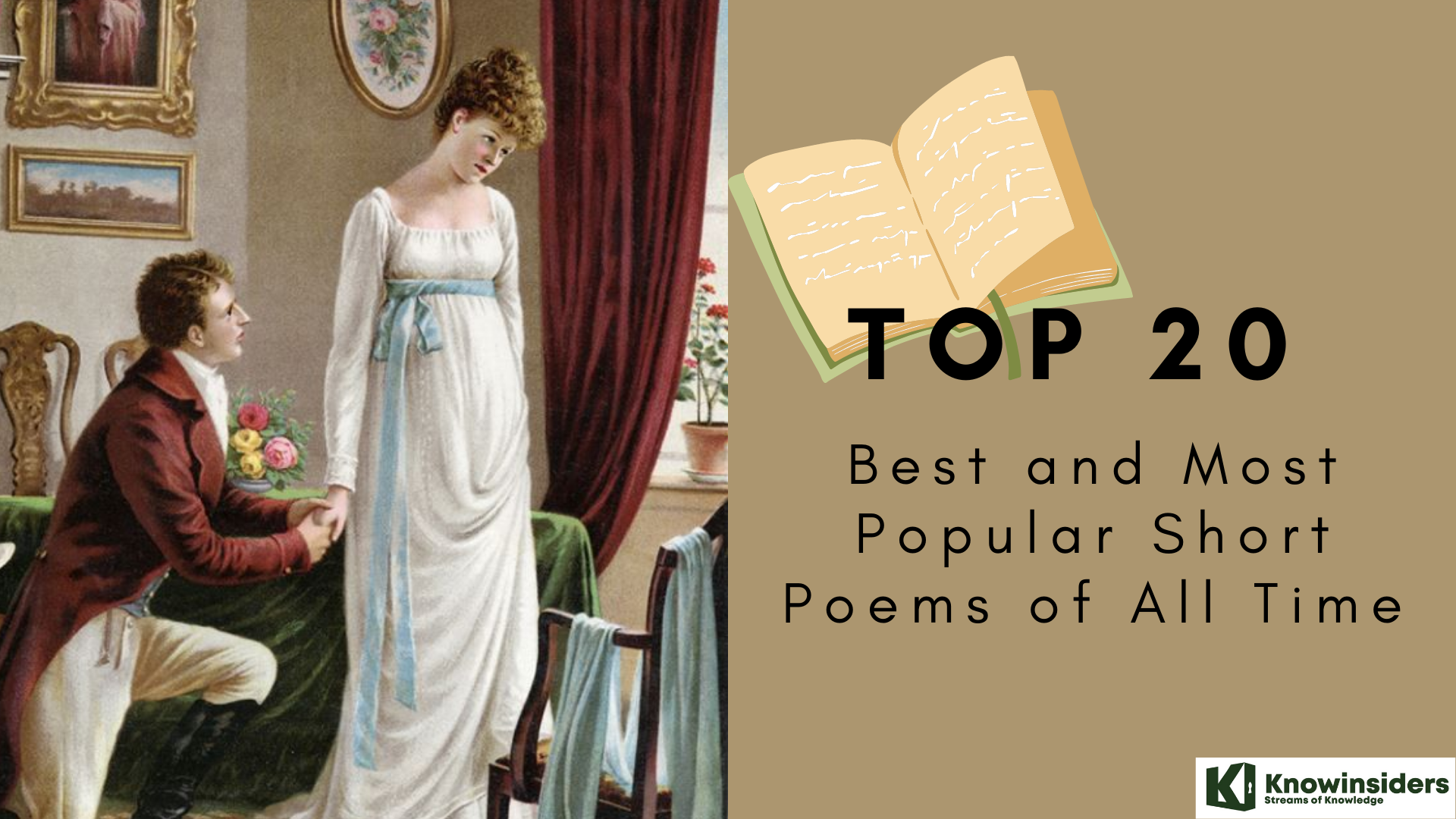 |
| Top 20 Best and Most Popular Short Poems of All Time |
| Table Content |
Great poetry can be any length: long poems can sprawl across pages like interstate highways, but short poems can be just as moving and powerful. Short form poetry, which includes forms like micropoetry, pack lots of meaning in a small amount of space, according to Writers.
We have compiled a list of these top 20 most popular short poems of all time after searching up literature websites, social media and adding our favorite poems. We hope you can find this list helpful, in which provides you a deeper look into the world of short poetry.
What Are Short Poems?
Short poems are, well, short. But the best short poems share certain qualities that make them potent pieces of literature.
Short form poetry should have all or most of the following features: Concision, Concreteness, Ephemerality and Simplicity.
Short form poetry presents slices of life: moments of emotions crystalized into language.
Common literary devices in short poetry are metaphor, symbolism, and juxtaposition.
Take a look at these 20 best and most famous short poems of all time.
List of top 20 best and most popular short poems of all time
20. “Love and Friendship” by Emily Bronte
19. “A Dream Within A Dream” by Edgar Allan Poe
18. “When You Come” by Maya Angelou
17. “Still Here” by Langston Hughes
16. “Do Not Stand At My Grave And Weep” by Mary Elizabeth Frye
15. “A Fairy Song” by William Shakespeare
14. “Remember” by Christina Georgina Rossetti
13. “How far is it to Heaven?” by Emily Dickinson
12. “We Alone” by Alice Walker
11. “If” by Rudyard Kipling
10. “Trees” by Joyce Kilmer
9. “Loves Secret” by William Blake
8. “The Rose that Grew from Concrete” by Tupac Shakur
7. “Fire And Ice” by Robert Frost
6. “If You Forget Me” by Pablo Neruda
5. “Shall I Compare Thee To A Summer’s Day?” by William Shakespeare
4. “There Will Come Soft Rain” by Sara Teasdale
3. “Still I Rise” by Maya Angelou
2. “Stopping by Woods On a Snowy Evening” by Robert Frost
1. “Im nobody! Who are you?” by Emily Dickinson
What are the best and most popular short poems of all time?
20. “Love and Friendship” by Emily Bronte
Love is like the wild rose-briar,
Friendship like the holly-tree—
The holly is dark when the rose-briar blooms
But which will bloom most constantly?
The wild rose-briar is sweet in spring,
Its summer blossoms scent the air;
Yet wait till winter comes again
And who will call the wild-briar fair?
Then scorn the silly rose-wreath now
And deck thee with the holly’s sheen,
That when December blights thy brow
He still may leave thy garland green.
Many poems see love and friendship as a natural partnership, but in this poem, Emily Brontë sees them as related (she likens them both to flowering plants) but substantially different. Love is like the rose briar (reminding us of the old poets’ adage, ‘every rose has its thorn’: love has a dangerous as well as thrilling side) whereas friendship is like the holly tree. In the first stanza of ‘Love and Friendship’, Brontë reminds us that when we fall in love, in that first flush of excitement when we first meet someone and fall for them, we neglect our friends, but friendship, unlike love, will not desert us.
Emily Brontë uses this simple parallel of the rose and the holly to illuminate and analyse the central distinction between love and friendship. Although this poem is a minor piece, it arguably helps to enrich our understanding of Brontë’s other work, namely her novel, Wuthering Heights. There, too, love will prove to be wild and tempestuous, but ultimately (self-)destructive.
Source: Interesting Literature
19. “A Dream Within A Dream” by Edgar Allan Poe
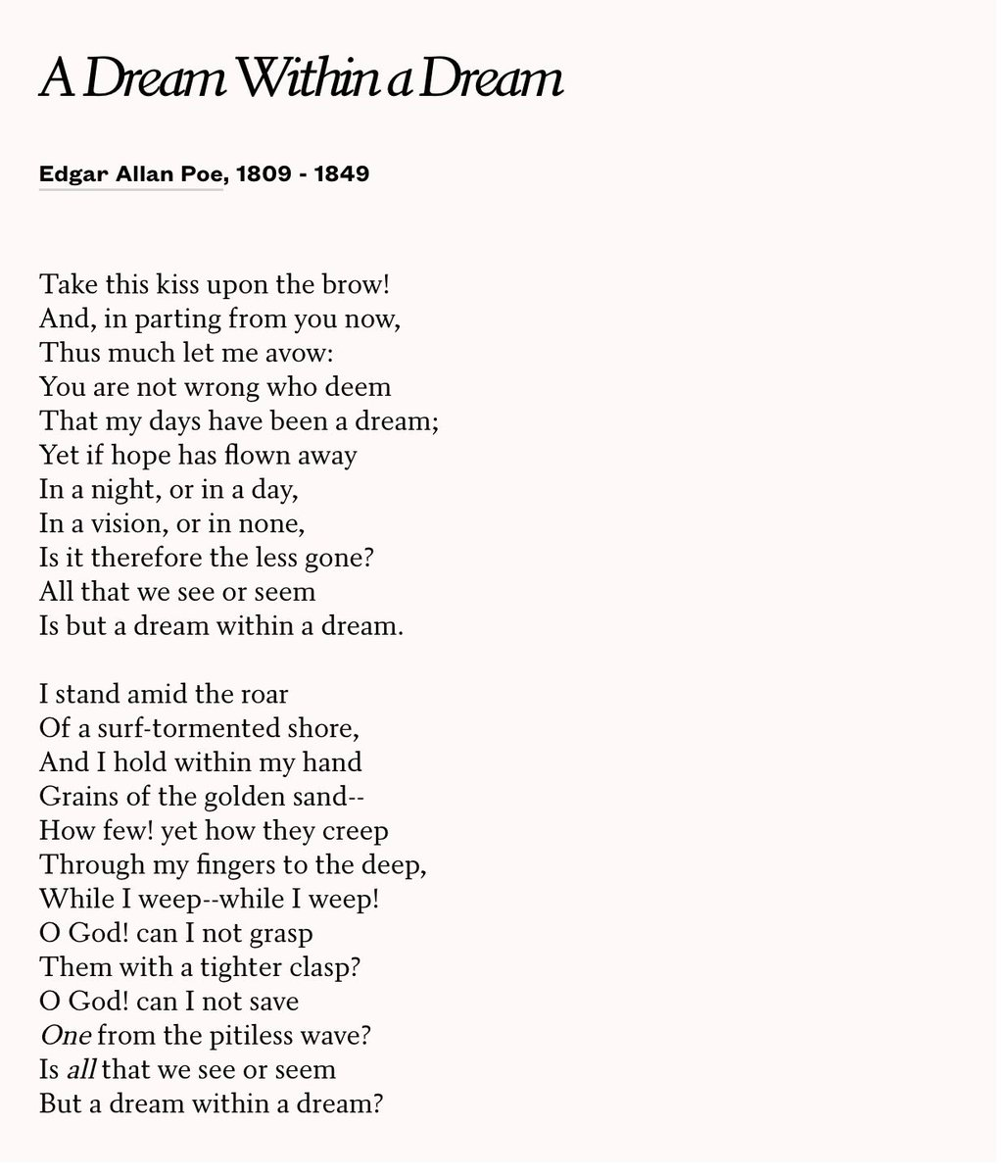 |
| Photo: Twitter |
Take this kiss upon the brow!
And, in parting from you now,
Thus much let me avow —
You are not wrong, who deem
That my days have been a dream;
Yet if hope has flown away
In a night, or in a day,
In a vision, or in none,
Is it therefore the less gone?
All that we see or seem
Is but a dream within a dream.
I stand amid the roar
Of a surf-tormented shore,
And I hold within my hand
Grains of the golden sand —
How few! yet how they creep
Through my fingers to the deep,
While I weep — while I weep!
O God! Can I not grasp
Them with a tighter clasp?
O God! can I not save
One from the pitiless wave?
Is all that we see or seem
But a dream within a dream?
"A Dream Within a Dream" is a poem written by American poet Edgar Allan Poe, first published in 1849. The poem has 24 lines, divided into two stanzas.
The poem dramatizes the confusion felt by the narrator as he watches the important things in life slip away. Realizing he cannot hold on to even one grain of sand, he is led to his final question whether all things are just a dream.
It has been suggested that the "golden sand" referenced in the 15th line signifies that which is to be found in an hourglass, consequently time itself. Another interpretation holds that the expression evokes an image derived from the 1848 finding of gold in California. The latter interpretation seems unlikely, however, given the presence of the four, almost identical, lines describing the sand in another poem "To ——," which is regarded as a blueprint for "A Dream Within a Dream" and preceding its publication by two decades, according to Wikipedia.
The poem was first published in the March 31, 1849, edition of the Boston-based story paper The Flag of Our Union. The same publication had only two weeks before first published Poe's short story "Hop-Frog." The next month, owner Frederick Gleason announced it could no longer pay for whatever articles or poems it published.
18. “When You Come” by Maya Angelou
When you come to me, unbidden,
Beckoning me
To long-ago rooms,
Where memories lie.
Offering me, as to a child, an attic,
Gatherings of days too few.
Baubles of stolen kisses.
Trinkets of borrowed loves.
Trunks of secret words,
I CRY.
‘When You Come’ by Maya Angelou is a moving poem about how one speaker deals with memories of a past lover.
The speaker begins by describing how sometimes, “you,” the intended listener and her past lover, comes “unbidden.” This describes how the listener comes into her mind, reminding her of the time they spent together. She metaphorically travels into the attic of her mind, looking at the baubles and trinkets that represent the time they shared, secret words, and kisses. This experience is one that’s filled with reminders of happier times and brings her to tears. Her sorrow at the end of the poem explains why she hides these memories away.
Throughout this poem, Angelou explores themes of love and loss. The poet’s description of the attic of her speaker’s mind is an interesting one. It’s a great representative of how people store thoughts and experiences from the past and only explore them on occasion. Her loss is embodied through the dusty, unused items in her mind. Her love for this person is clear through the allusion to the time they spent together and through how moved she is by the experience of reliving those moments.
Source: Poem Analysis
17. “Still Here” by Langston Hughes
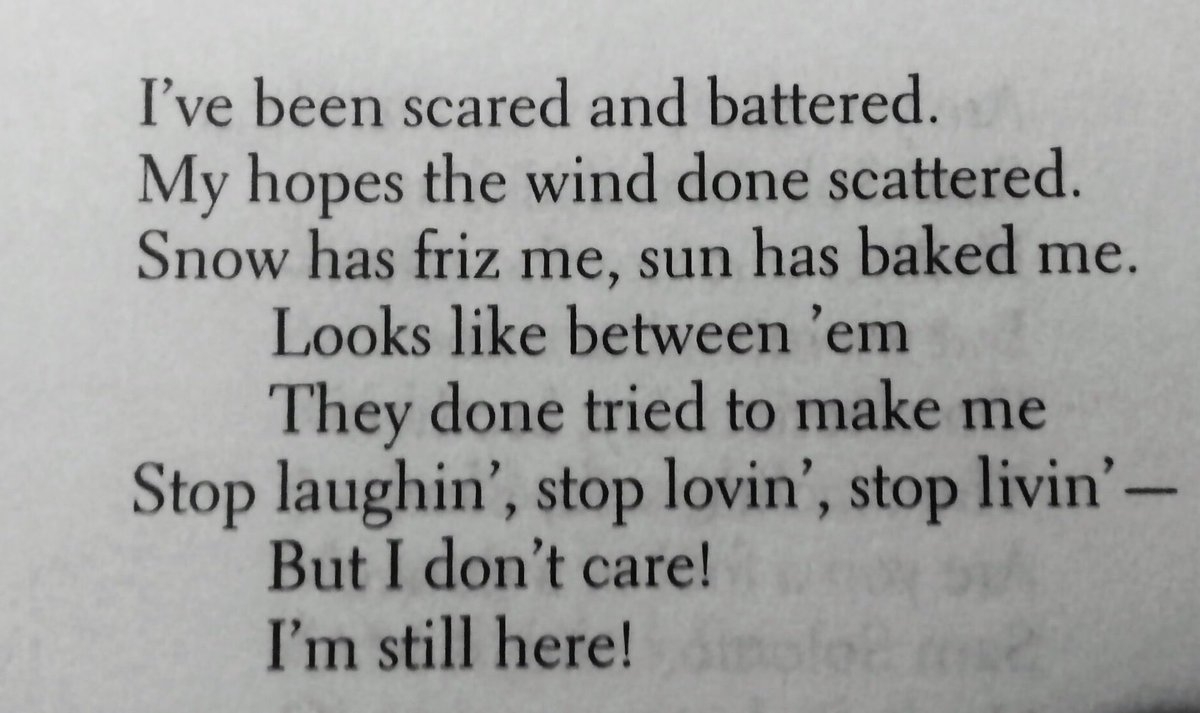 |
| Photo: Ciarán Quinn via Twitter |
I been scarred and battered.
My hopes the wind done scattered.
Snow has friz me,
Sun has baked me,
Looks like between 'em they done
Tried to make me
Stop laughin', stop lovin', stop livin'--
But I don't care!
I'm still here!
Still here by Langston Hughes is a poem that is grounded in varying grammar concepts to indicate weariness through struggle and clarity after the struggle concludes. The confusion of the struggle is presented in a juxtaposed format, coming just before the certain finale of victory, and the overall idea is that staying strong through the problems is worth that concluding victory and empowerment.
Langston Hughes was born in 1902 and passed away in 1967. His life was highly connected to the world of writing, and his technique in the field can be noted through poems, novels, and plays that carry his name. He is also known for his work regarding social reform.
Source: Poem Analysis
16. “Do Not Stand At My Grave And Weep” by Mary Elizabeth Frye
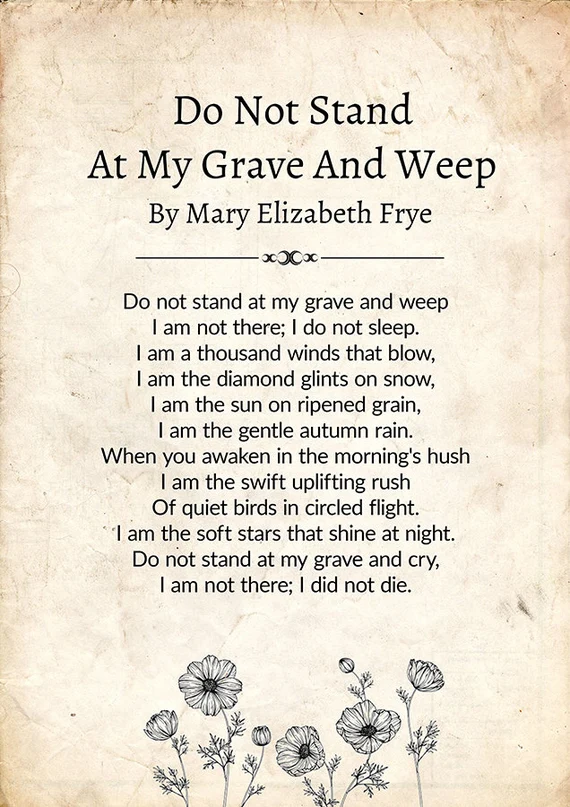 |
| Photo: Etsy |
Do not stand at my grave and weep,
I am not there, I do not sleep.
I am in a thousand winds that blow,
I am the softly falling snow.
I am the gentle showers of rain,
I am the fields of ripening grain.
I am in the morning hush,
I am in the graceful rush
Of beautiful birds in circling flight,
I am the starshine of the night.
I am in the flowers that bloom,
I am in a quiet room.
I am in the birds that sing,
I am in each lovely thing.
Do not stand at my grave and cry,
I am not there. I do not die.
"Do not stand at my grave and weep" is the first line and popular title of a bereavement poem of disputed authorship. The poem was popularized during the late 1970s thanks to a reading by John Wayne that inspired further readings on television. During the late 1990s, Mary Elizabeth Frye claimed to have written the poem in 1932. This was purportedly confirmed in 1998 research conducted for the newspaper column "Dear Abby" (Pauline Phillips). However, the Oxford journal "Notes and Queries" published a 2018 article claiming the poem, originally titled "Immortality", was in fact written by Clare Harner Lyon (1909-1977) and first published under her maiden name (Harner) in the December 1934 issue of The Gypsy poetry magazine.
According to the London Times obituary for the "Baltimore housewife Mary E. Frye," Dear Abby author "Abigail Van Buren" researched the poem's history and concluded in 1998 that Ohio native Mary Elizabeth Frye (November 13, 1905 – September 15, 2004), a self-employed florist and amateur poet, who was living in Baltimore at the time, had written the poem in 1932. In print, however, Dear Abby columns by Pauline Phillips and her daughter Jeanne consistently treated authorship of the poem as an unsolved mystery. As late as 2004, Jeanne Phillips acknowledged, "I regret that I have never been able to confirm the author." Supposedly Frye had never written any poetry, but the plight of a German Jewish woman, Margaret Schwarzkopf, who was staying with her and her husband, had inspired the poem. Margaret Schwarzkopf was concerned about her mother, who was ill in Germany, but she had been warned not to return home because of increasing unrest. When her mother died, the heartbroken young woman told Frye that she never had the chance to "stand by my mother's grave and shed a tear". Frye, according to Van Buren's supposed research, found herself composing a piece of verse on a brown paper shopping bag. Later she said that the words "just came to her" and expressed what she felt about life and death, according to Wikipedia.
According to her account, Frye circulated the poem privately, never publishing it. Her obituary in The Times asserted her claim to authorship of the famous poem, which has been recited at funerals and on other appropriate occasions around the world for 60 years.
15. “A Fairy Song” by William Shakespeare
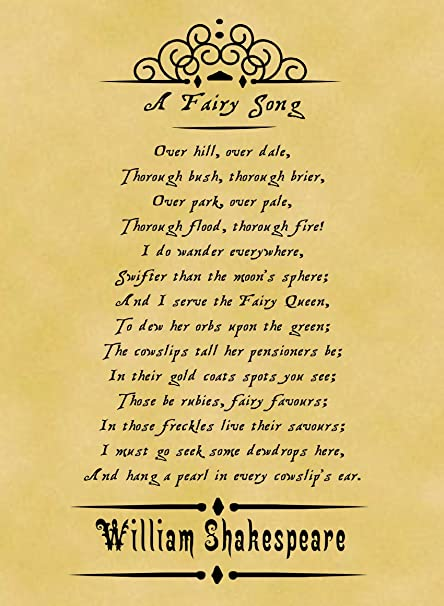 |
| Photo: Amazon |
Over hill, over dale,
Thorough bush, thorough brier,
Over park, over pale,
Thorough flood, thorough fire!
I do wander everywhere,
Swifter than the moon's sphere;
And I serve the Fairy Queen,
To dew her orbs upon the green;
The cowslips tall her pensioners be;
In their gold coats spots you see;
Those be rubies, fairy favours;
In those freckles live their savours;
I must go seek some dewdrops here,
And hang a pearl in every cowslip's ear.
‘A Fairy Song’ by William Shakespeare is an interesting and musical monologue from A Midsummer Night’s Dream.
IN the first lines of this song, the fairy begins by saying that they travel “over hills” and “dales,” or valleys. They go through bushes and over confined spaces. They travel through water and fire. These dramatic lines are followed by more seemingly hyperbolic statements. They say they wander faster or swifter than the moon goes around the earth. Then, that they work for Titania, the Fairy Queen, they organize dances.
The speaker also describes the cowslip flowers are “her pensioners,” or bodyguards. Their petals contain rubies and smell sweet. Now, the speaker concludes, they have to go and find some “dewdrops” and hang a pearl on every cowslip’s ear. The fairy says goodbye to Robin, calling him a “lob of spirits,” and announces that the queen is coming soon.
Source: Poem Analysis
14. “Remember” by Christina Georgina Rossetti
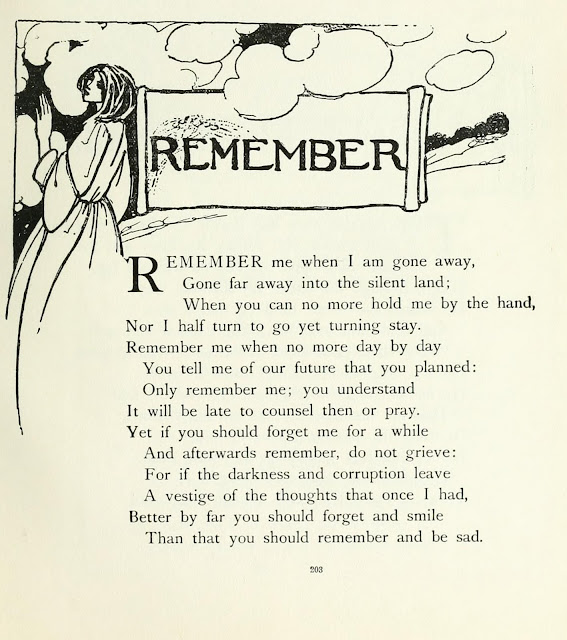 |
| Photo: alaradilrap |
Remember me when I am gone away,
Gone far away into the silent land;
When you can no more hold me by the hand,
Nor I half turn to go yet turning stay.
Remember me when no more day by day
You tell me of our future that you plann'd:
Only remember me; you understand
It will be late to counsel then or pray.
Yet if you should forget me for a while
And afterwards remember, do not grieve:
For if the darkness and corruption leave
A vestige of the thoughts that once I had,
Better by far you should forget and smile
Than that you should remember and be sad.
‘Remember’, written by Christina Rossetti (1830-1894) when she was still a teenager, is a classic Victorian poem about mourning and remembrance. It was written in 1849 but not published until 1862 when it appeared in Rossetti’s first volume, Goblin Market and Other Poems.
In summary, the poet requests that the addressee of the poem remember her after she has died. (The addressee is presumably her lover, since they had ‘plann’d’ a ‘future’ together.) But what gives the poem a twist is the concluding thought that it would be better for her loved one to forget her and be happy than to remember her if it makes that Rossettiperson sad. It is this second part of the poem’s ‘argument’ that saves it from spilling over into mawkish sentimentality.
Source: Interesting Literature
13. “How far is it to Heaven?” by Emily Dickinson
How far is heaven?
Let's go tonight, I want my daddy to hold me tight.
A little girl was waiting for her daddy one day
It was time to meet him, when she heard her mommy say
Come to mommy darling, please do not cry
Daddy's gone to heaven, way up in the sky
How far is heaven?
When can I go?
To see my daddy, he's there I know.
How far is heaven?
Let's go tonight.
I want my daddy to hold me tight.
He was called so suddenly, and could not say goodbye
I know that he's in heaven, we'll meet him by and by
The little girl trembled, her tears she could not hide
She looked up for heaven and then she replied
How far is heaven?
When can I go?
To see my daddy, he's there I know.
How far is heaven?
Let's go tonight
I want my daddy to hold me tight.
Emily Dickinson is an American poet who has written many famous English poems in her lifetime. She had spent her life in solitude, where she had no visitors to meet her, or never met anyone. She wrote many poems on nature and religion. She had written some poems to her father and sister-in law as a token of communication.
While Dickinson was a prolific writer, her only publications during her lifetime were 10 of her nearly 1,800 poems, and one letter. The poems published then were usually edited significantly to fit conventional poetic rules. Her poems were unique for her era. They contain short lines, typically lack titles, and often use slant rhyme as well as unconventional capitalization and punctuation. Many of her poems deal with themes of death and immortality, two recurring topics in letters to her friends, and also explore aesthetics, society, nature and spirituality.
12. “We Alone” by Alice Walker
We alone can devalue gold
by not caring
if it falls or rises
in the marketplace.
Wherever there is gold
there is a chain, you know,
and if your chain
is gold
so much the worse
for you.
Feathers, shells
and sea-shaped stones
are all as rare.
This could be our revolution:
to love what is plentiful
as much as
what's scarce.
In this famous poem, We Alone, based on humanity, love, and money, Alice Walker reveals the power within each human heart, and the power we have together when united in purpose. She begins We Alone with a strong statement and one that makes the reader stop and ponders the power of the human race.
Alice Walker is one of the most loved African American writers. Her work has inspired many. In her early years, her mother was a maid and worked hard to provide a meager living for her and her seven siblings. Although she was raised in poverty and aspired to the position of renowned writer, this particular poem seems to suggest that the author does not relish fame or fortune. Rather, she suggests that fortune has a chain that binds its owner. She reveals that she has found enjoyment in seashells and feathers and other parts of nature. Though she has experienced poverty and fame, We Alone reveals that she does not find her enjoyment in fame or money or power. She rather would prefer that people would collectively give value to nature and one another and the simple pleasures of life rather than money and power.
Source: Poem Analysis
11. “If” by Rudyard Kipling
If you can keep your head when all about you
Are losing theirs and blaming it on you;
If you can trust yourself when all men doubt you,
But make allowance for their doubting too:
If you can wait and not be tired by waiting,
Or, being lied about, don’t deal in lies,
Or being hated don’t give way to hating,
And yet don’t look too good, nor talk too wise;
If you can dream- -and not make dreams your master;
If you can think- -and not make thoughts your aim,
If you can meet with Triumph and Disaster
And treat those two impostors just the same:.
If you can bear to hear the truth you’ve spoken
Twisted by knaves to make a trap for fools,
Or watch the things you gave your life to, broken,
And stoop and build’em up with worn-out tools;
If you can make one heap of all your winnings
And risk it on one turn of pitch-and-toss,
And lose, and start again at your beginnings,
And never breathe a word about your loss:
If you can force your heart and nerve and sinew
To serve your turn long after they are gone,
And so hold on when there is nothing in you
Except the Will which says to them: ‘Hold on! ‘
If you can talk with crowds and keep your virtue,
Or walk with Kings- -nor lose the common touch,
If neither foes nor loving friends can hurt you,
If all men count with you, but none too much:
If you can fill the unforgiving minute
With sixty seconds’ worth of distance run,
Yours is the Earth and everything that’s in it,
And- -which is more- -you’ll be a Man, my son!
The poem ‘If’ by the India-born British Nobel laureate poet Rudyard Kipling is a poem of ultimate inspiration that tells us how to deal with different situations in life. The poet conveys his ideas about how to win this life, and after all, how to be a good human being.
The poem, written in 1895 and first published in ‘Rewards and Fairies’, 1910 is 32 lines long with four stanzas of eight lines each. It is a tribute to Leander Starr Jameson. The poem is written in the form of paternal advice to the poet’s son, John.
10. “Trees” by Joyce Kilmer
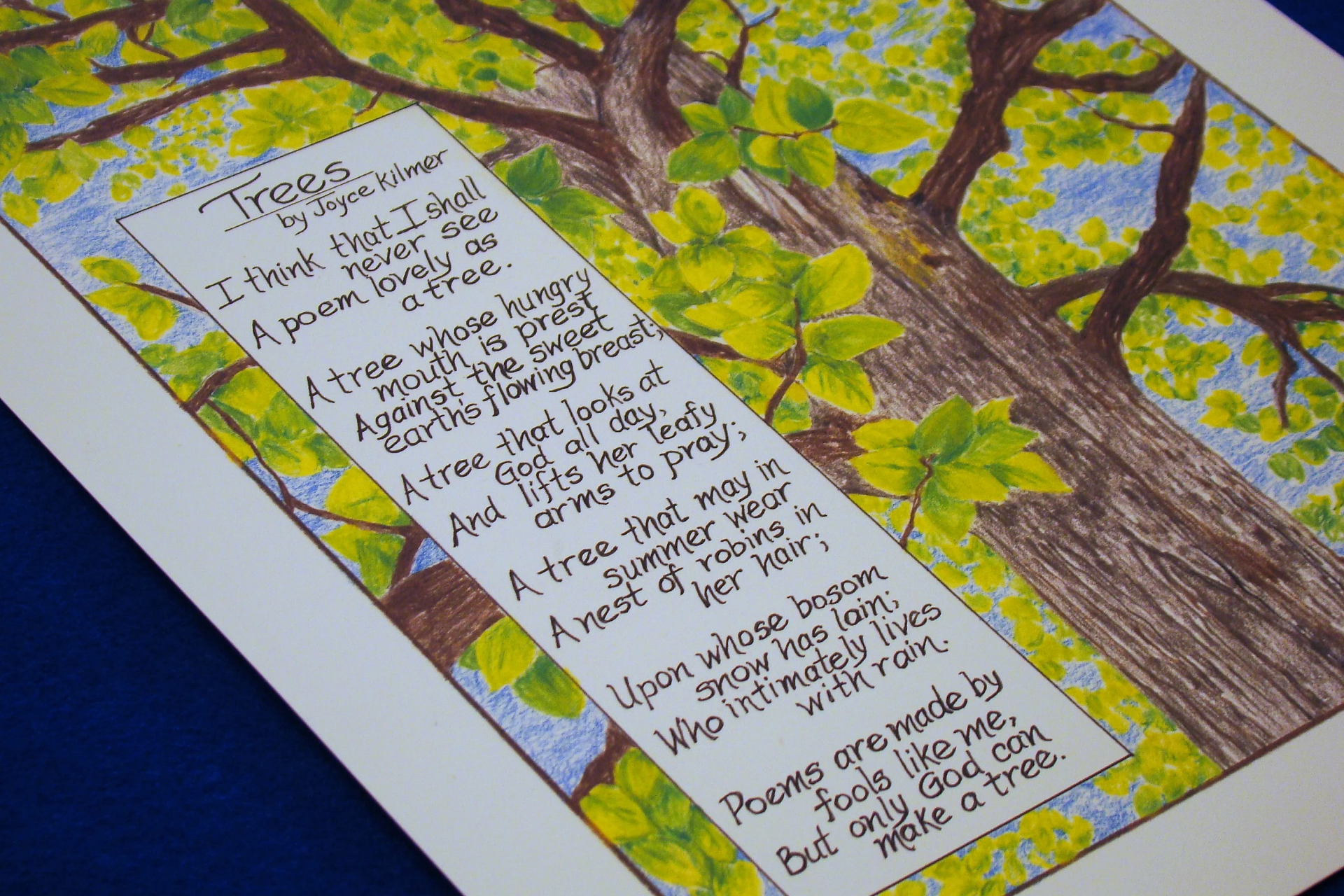 |
| Photo: Etsy |
I think that I shall never see
A poem lovely as a tree.
A tree whose hungry mouth is prest
Against the earth’s sweet flowing breast;
A tree that looks at God all day,
And lifts her leafy arms to pray;
A tree that may in Summer wear
A nest of robins in her hair;
Upon whose bosom snow has lain;
Who intimately lives with rain.
Poems are made by fools like me,
But only God can make a tree.
‘Trees’ by Joyce Kilmer was written in February of 1913 and was first published in Poetry: A Magazine of Verse. It was then included in Trees and Other Poems, one of Kilmer’s most popular volumes. It is for ‘Trees’ that Kilmer is most widely remembered. The poem has become well-loved due to its accessible simplicity and has been frequently included in popular anthologies of modern poetry. In more recent years, it has been set to music and performed by several different musicians.
There has been speculation since the conception of this piece about whether or not there was one tree the poet had in mind while composing the text. It has been suggested that Rutgers University or the University of Notre Dame are possible locations for the tree Kilmer has in mind. Although, the poet later stated the poem was written in the family home in Mahwah, New Jersey likely placing the specific setting, (if there is one), there.
Throughout ‘Trees’ Kilmer explores themes of God’s creation, wonder, and nature. The poem celebrates the world that the Christian God created and wonders over its vast complexity. The speaker knows, very clearly and fully, that he’ll never see/write a poem as “lovely as a tree”. Through this statement, he is admitting his own inability to live up to the creation of the natural world. The power to make something as beautiful and wonderful as a tree is reserved for God.
Source: Poem Analysis
9. “Loves Secret” by William Blake
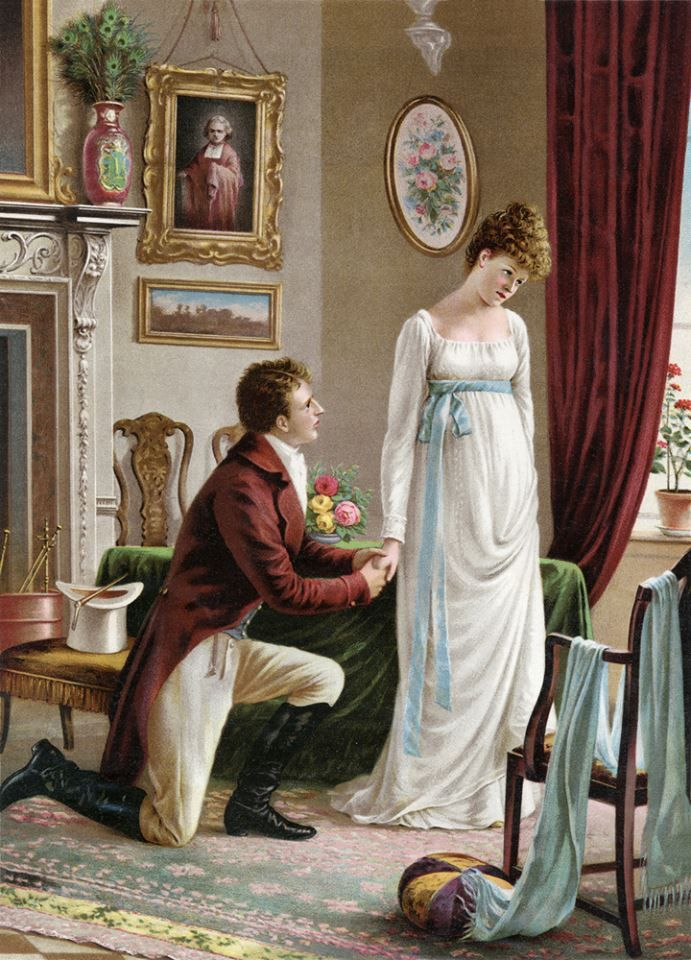 |
| Photo: Pinterest |
Never seek to tell thy love,
Love that never told can be;
For the gentle wind doth move
Silently, invisibly.
I told my love, I told my love,
I told her all my heart,
Trembling, cold, in ghastly fears.
Ah! she did depart!
Soon after she was gone from me,
A traveller came by,
Silently, invisibly:
He took her with a sigh.
The basic story here is of a speaker who lets his lover know of his feelings and emotions toward her, which in turn results in the lover's repudiation of him: “Trembling cold in ghastly fears / As she doth depart!” Never to be one who spends too much time in self-pity mode, Blake (as speaker?) quickly reverses his bleak situation in the last stanza by rekindling his spirits and assuming the ‘traveler’ loves him as well, because of his/her ‘invisibility’ and silence toward him as she passes. The emotional effect this plays on the reader is playful, taking him/her from one of pity to one of humor, now laughing with the speaker with whom only a few lines earlier he/she was feeling sorry for.
A break away from Blake’s regular themes of lost innocence and political/religious restraint on the human soul, “Love’s Secret” offers the reader a refreshing look at a speaker exploring the themes of the freedoms one experiences by not being in love: freedom from jealousy, freedom from admiration and affection, freedom from desire, and freedom from want. As sardonic as it is, the poem offers up the advice that one is better off not announcing one's affection for another, but rather should remain “silent and invisible.”
Source: Grade Saver
8. “The Rose that Grew from Concrete” by Tupac Shakur
Did you hear about the rose that grew
from a crack in the concrete?
Proving nature's law is wrong it
learned to walk with out having feet.
Funny it seems, but by keeping its dreams,
it learned to breathe fresh air.
Long live the rose that grew from concrete
when no one else ever cared.
The Rose That Grew From Concrete written by famous rapper and actor of America is a symbolic poem in which the poet describes the journey of Rose from the darkness in the concrete to fresh air and sunlight.
However, the poem also represents his own journey from a poor ghetto to a successful life. In the poem, the poet urges the readers and audience to rise above the ghettos which are like concrete i.e. hard enough to become a hindrance in the way to success.
The poem is quite short consisting of the single stanza that has eight lines. There is no specific rhyme scheme. The poet uses a number of literary devices in the poem.
Source: English Summary
7. “Fire And Ice” by Robert Frost
Some say the world will end in fire,
Some say in ice.
From what I’ve tasted of desire
I hold with those who favor fire.
But if it had to perish twice,
I think I know enough of hate
To say that for destruction ice
Is also great
And would suffice.
‘Fire and Ice’ by Robert Frost explores a universal interest in the apocalypse. It has always been a phenomenon capable of capturing people’s minds.
Throughout history, there has always been a seeming fascination with how the world will end. In recent years, these discussions have centered around nuclear disaster, immense climate change, and general cynicism. Two thousand years ago (give or take), the Revelations chapter was added into the Christian Bible, detailing a prophetic vision of the end of the world. This has long been a topic embedded in the human psyche. At some point between the present and Revelations’ authorship (closer to the present though), Robert Frost added his own ideas to the mix, and the result was Fire and Ice, one of his most well-known poems, and certainly one of his most powerful ones. This poem is known for its simplicity and biting message, as well as its call to stop and think, offering a different perspective on the end of everything.
The point of Fire and Ice seems to get at the idea that arguing over how the world ends isn’t going to delay or prolong the arrival of the event. For the speaker of the poem, presumably in the voice of Robert Frost, it really doesn’t matter whether it’s one thing or another that makes things bad. What matters is what is done about the heat or cold (ironically, the other one, though the desire-hatred metaphor doesn’t work so well as a way to balance out the other). In a way, this poem is a call to act, to stop arguing about the how — “how will this happen?” — and start debating the what — “what can we do to stop it?”
Source: Poem Analysis
6. “If You Forget Me” by Pablo Neruda
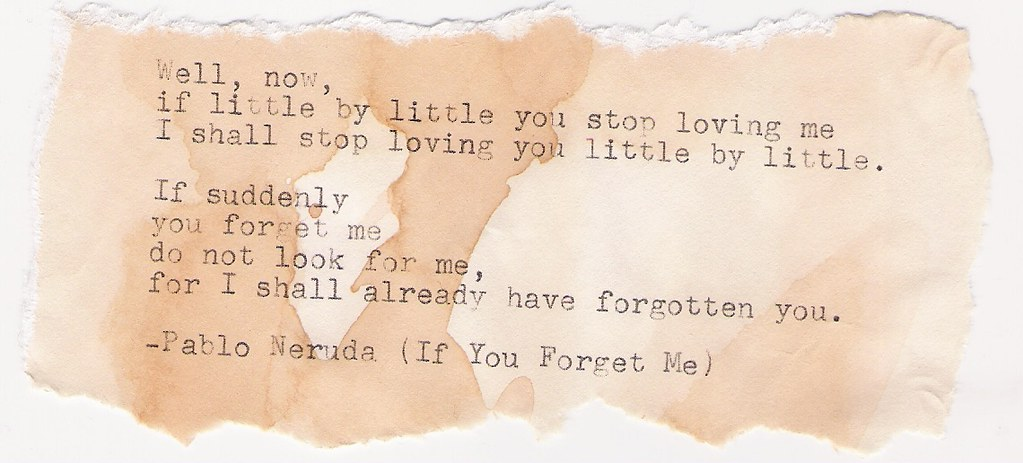 |
| Photo: Flickr |
I want you to know
one thing.
You know how this is:
if I look
at the crystal moon, at the red branch
of the slow autumn at my window,
if I touch
near the fire
the impalpable ash
or the wrinkled body of the log,
everything carries me to you,
as if everything that exists,
aromas, light, metals,
were little boats
that sail
toward those isles of yours that wait for me.
Well, now,
if little by little you stop loving me
I shall stop loving you little by little.
If suddenly
you forget me
do not look for me,
for I shall already have forgotten you.
If you think it long and mad,
the wind of banners
that passes through my life,
and you decide
to leave me at the shore
of the heart where I have roots,
remember
that on that day,
at that hour,
I shall lift my arms
and my roots will set off
to seek another land.
But
if each day,
each hour,
you feel that you are destined for me
with implacable sweetness,
if each day a flower
climbs up to your lips to seek me,
ah my love, ah my own,
in me all that fire is repeated,
in me nothing is extinguished or forgotten,
my love feeds on your love, beloved,
and as long as you live it will be in your arms
without leaving mine.
Pablo Neruda’s poem ‘If You Forget Me’ is a poem that speaks directly to the author’s lover, warning her what will happen if she falls out of love with the speaker. While Neruda was married to Argentinian writer Delia del Carril at the time the poem was written, many believe Neruda wrote this to his lover, Matilde Urrutia, the woman who would later become his wife. Neruda, a Communist senator in Chile, was exiled from his native land for thirteen months after the fall of Communism in 1948, and this poem was most likely written while Neruda was in exile. Other critics believe this poem was written not to his lover, but to his homeland of Chile, warning her not to forget him while he is forced away. Regardless of the interpretation, the poem is one of the most popular love poems in literature, and Neruda is often called one of the greatest poets in the twentieth century; he was awarded the Nobel Prize for Literature in 1971.
This is a poem, written by Pablo Neruda, presumably the speaker of the work, to his lover, warning her of what will happen if she forgets him while he is away. In the beginning of the poem, Neruda presents a loving and romantic picture for his lover, reminding her of how much he loves her. However, towards the middle of the poem, his tone changes, warning her that if she stops loving him, he will also cease to love her. The tone in the last stanza of the poem reverts back to the positive, romantic tone in the first section of the poem, and the speaker tells his lover that if she does not forget him, if she keeps on loving him, he will forever love her in return. The poem highlights how intense, yet fickle, a love between a man and woman can be.
Source: Poem Analysis
5. “Shall I Compare Thee To A Summer’s Day?” by William Shakespeare
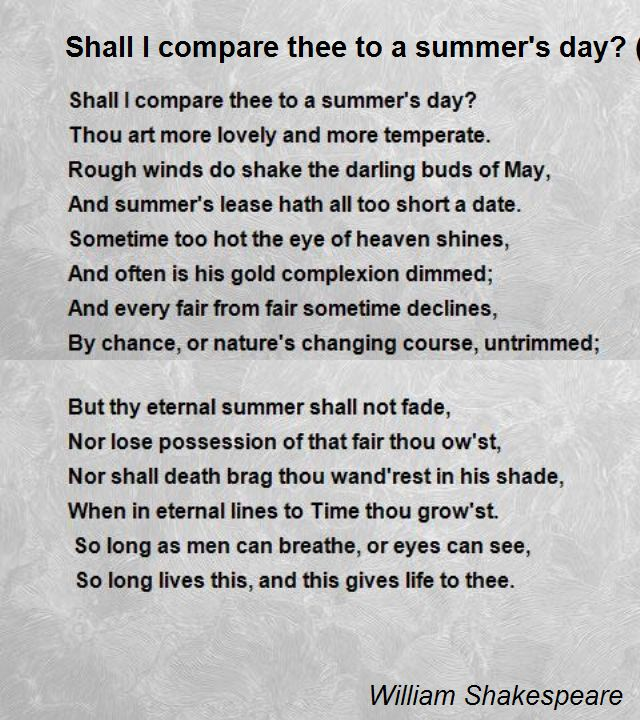 |
| Photo: Poem Hunter |
Shall I compare thee to a summer’s day?
Thou art more lovely and more temperate.
Rough winds do shake the darling buds of May,
And summer’s lease hath all too short a date.
Sometime too hot the eye of heaven shines,
And often is his gold complexion dimmed;
And every fair from fair sometime declines,
By chance, or nature’s changing course, untrimmed;
But thy eternal summer shall not fade,
Nor lose possession of that fair thou ow’st,
Nor shall death brag thou wand’rest in his shade,
When in eternal lines to Time thou grow’st.
So long as men can breathe, or eyes can see,
So long lives this, and this gives life to thee.
"Sonnet 18" is one of the best-known of the 154 sonnets written by the English playwright and poet William Shakespeare.
In the sonnet, the speaker asks whether he should compare the young man to a summer's day, but notes that the young man has qualities that surpass a summer's day. He also notes the qualities of a summer day are subject to change and will eventually diminish. The speaker then states that the young man will live forever in the lines of the poem, as long as it can be read. There is an irony being expressed in this sonnet: it is not the actual young man who will be eternalized, but the description of him contained in the poem, and the poem contains scant or no description of the young man, but instead contains vivid and lasting descriptions of a summer day, which the young man is supposed to outlive.
The poem is part of the Fair Youth sequence (which comprises sonnets 1–126 in the accepted numbering stemming from the first edition in 1609). It is also the first of the cycle after the opening sequence now described as the procreation sonnets. Some scholars, however, contend that it is part of the procreation sonnets, as it addresses the idea of reaching eternal life through the written word, a theme they find in sonnets 15–17. In this view, it can be seen as part of a transition to sonnet 20's time theme.
4. “There Will Come Soft Rain” by Sara Teasdale
(War Time)
There will come soft rains and the smell of the ground,
And swallows circling with their shimmering sound;
And frogs in the pools singing at night,
And wild plum trees in tremulous white,
Robins will wear their feathery fire
Whistling their whims on a low fence-wire;
And not one will know of the war, not one
Will care at last when it is done.
Not one would mind, neither bird nor tree
If mankind perished utterly;
And Spring herself, when she woke at dawn,
Would scarcely know that we were gone.
‘There Will Come Soft Rains’ is a beautiful, image-rich poem. In it, Teasdale describes the impact, or lack thereof, that humanity really has on the natural world.
While we are no doubt incredibly destructive, the relationship is so nonreciprocal that if humanity disappeared off the planet, no other living things would even notice we were gone. While speaking about nature, Teasdale also alludes to war. ‘There Will Come Soft Rains’ was written during the 1918 German Spring Offensive during the First World War. It is likely that Teasdale was also inspired by the 1918 flu pandemic that was happening at the same time.
The poem begins with the speaker describing a number of scenes of peace. There are birds circling, singing out their “shimmering sound[s],” as well as frogs croaking in pools of water at night. The wind, trees, and creatures of the world are in alignment and are content with one another.
The second half of the poem describes how nature and “Spring” would not notice if all of humankind was at war. It would not impact them in the slightest. Additionally, they would not notice if every person on the planet disappeared, so little do humans fit into their world.
Source: Poem Analysis
3. “Still I Rise” by Maya Angelou
You may write me down in history
With your bitter, twisted lies,
You may trod me in the very dirt
But still, like dust, I'll rise.
Does my sassiness upset you?
Why are you beset with gloom?
’Cause I walk like I've got oil wells
Pumping in my living room.
Just like moons and like suns,
With the certainty of tides,
Just like hopes springing high,
Still I'll rise.
Did you want to see me broken?
Bowed head and lowered eyes?
Shoulders falling down like teardrops,
Weakened by my soulful cries?
Does my haughtiness offend you?
Don't you take it awful hard
’Cause I laugh like I've got gold mines
Diggin’ in my own backyard.
You may shoot me with your words,
You may cut me with your eyes,
You may kill me with your hatefulness,
But still, like air, I’ll rise.
Does my sexiness upset you?
Does it come as a surprise
That I dance like I've got diamonds
At the meeting of my thighs?
Out of the huts of history’s shame
I rise
Up from a past that’s rooted in pain
I rise
I'm a black ocean, leaping and wide,
Welling and swelling I bear in the tide.
Leaving behind nights of terror and fear
I rise
Into a daybreak that’s wondrously clear
I rise
Bringing the gifts that my ancestors gave,
I am the dream and the hope of the slave.
I rise
I rise
I rise.
Maya Angelou, born in 1928, lived through some of the worst oppression and inequality for African American people. Although slavery had been long abolished, Angelou saw its effects on society and the African American people. ‘Still I Rise’ is her declaration that she, for one, would not allow the hatefulness of society to determine her own success.
The poem, ‘Still I Rise,’ is not only a proclamation of her own determination to rise above society but was also a call to others to live above the society in which they were brought up.
The poem takes the reader through a series of statements the speaker makes about herself. She praises her strength, her body, and her ability to rise up and away from her personal and historical past. There is nothing, the speaker declares, that can hold her back. She is going to “rise” above and beyond anything that seeks to control her.
Source: Poem Analysis
2. “Stopping by Woods On a Snowy Evening” by Robert Frost
Whose woods these are I think I know.
His house is in the village though;
He will not see me stopping here
To watch his woods fill up with snow.
My little horse must think it queer
To stop without a farmhouse near
Between the woods and frozen lake
The darkest evening of the year.
He gives his harness bells a shake
To ask if there is some mistake.
The only other sound’s the sweep
Of easy wind and downy flake.
The woods are lovely, dark and deep,
But I have promises to keep,
And miles to go before I sleep,
And miles to go before I sleep.
Written by Robert Frost, this poem was published in 1923. It was written to capture the conflict between man and nature and also to highlight the difference between wishes and obligations we face in our lives. However, it has become one of the most popular poems in English literature.
As the poem is about nature, it has been written from the perspective of an adult, who stops by the woods to enjoy the mesmerizing beauty of nature. The expression of stopping given in the first stanza continues until the traveler decides to restart his journey. The expression of not knowing the woods and then realizing one’s duties mark the central point of the poem. However, what stays in the minds of the readers is the eye-catching and bewitching beauty of woods in the snowy evening.
The poem comprises the thoughts of an adult, why he stops and why he wants to stay in the lap of nature, forgetting all his worldly affairs. The traveler wants to take a moment to pause in the quiet woods to watch the snow falling. He says he knows whose woods are these, but he is sure the owner of the woods will not notice his presence because he is in the village.
Source: Literary Devices
1. “Im nobody! Who are you?” by Emily Dickinson
I'm Nobody! Who are you?
Are you – Nobody – too?
Then there's a pair of us!
Don't tell! they'd advertise – you know!
How dreary – to be – Somebody!
How public – like a Frog –
To tell one's name – the livelong June –
To an admiring Bog!
"I'm Nobody! Who are you?" is a short poem by American poet, Emily Dickinson, who wrote during the mid-19th century (though most of her poems were not published until the 1890s, after Dickinson had died). In the poem, a speaker introduces themselves—perhaps to the reader—as "Nobody," before excitedly realizing that the addressee is "Nobody" too. Paradoxically, this hints at a community of "Nobodies" out there. These people just don't make as much noise as all the "Somebodies," who crave attention and admiration. The poem, then, calls out to its readers to say that being humble, withdrawn, shy, or private is just fine. In fact, such a way of life has many virtues of its own. The poem is one of a number of Dickinson poems that questions the value of public admiration—something which eluded Dickinson in her own lifetime.
The poem begins with an introduction from the speaker, who announces themselves as “Nobody!” They ask the identity of the addressee—which could be the reader—and if they’re "Nobody" too. Presumably learning that the addressee is "Nobody" too, the speaker expresses that together they make a “pair” of “Nobodies.” The speaker instructs the addressee not to tell anyone about this, because other people would make a fuss—which, the speaker implies, is something the addressee already knows.
The speaker then talks about how boring it would be to be a “Somebody.” It would leave nothing private. The speaker likens being a somebody to being a frog.“Somebodies” spend their time talking themselves up to anyone who will give them attention and admire them, comparable to frogs making their noises in a swamp.
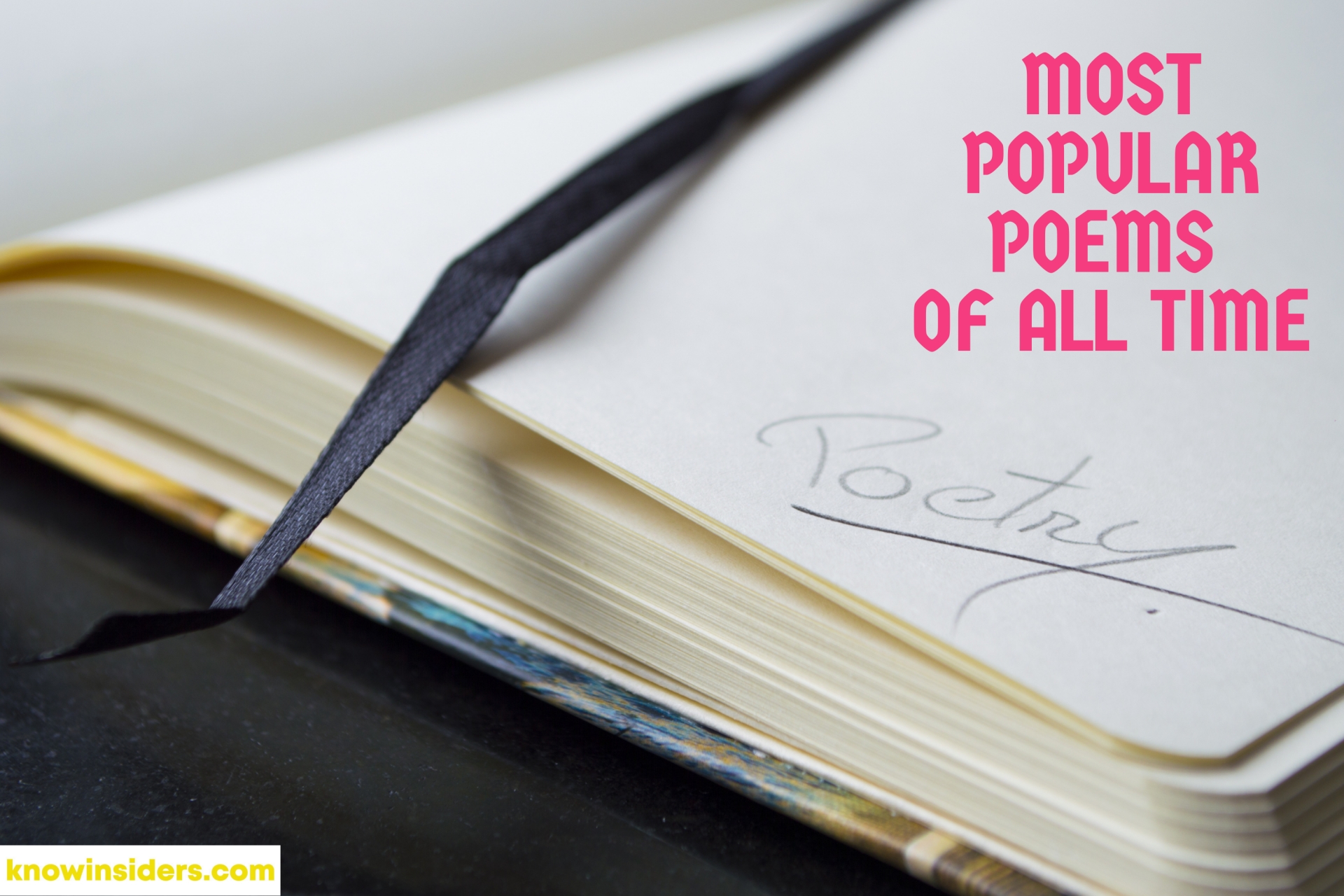 Top 20 Most Popular Poems (In English) Of All Time Top 20 Most Popular Poems (In English) Of All Time Robert Graves said “To be a poet is a condition, not a profession.” Great poets created great poems of all time. Check out The Top ... |
 Top 20 Most Sustainable Cities for Living Green In The World Top 20 Most Sustainable Cities for Living Green In The World What are the most sustainable cities in the world? Is the city you are living really green? Check out our list of Top 20 Most ... |
 Top 20 Free Internet TV Channels You Can Watch Online Legally Top 20 Free Internet TV Channels You Can Watch Online Legally To know which TV channels are free for daily broadcasting and watching news, keep reading the article below. |
 Top 20 Most Played Female Artists of The 21st Century Top 20 Most Played Female Artists of The 21st Century Music company PPL has revealed their list of top 20 most played female artists of 21st century. Keep reading to know who they are. |


























